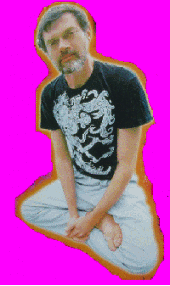Terence McKenna received a B.S. in Ecology and Conservation from the Tussman Experimental College, a short-lived outgrowth of UC Berkeley, in 1969. He spent the months after his graduation traveling through India and other Asian countries, alternately smuggling hashish and collecting butterflies for biological supply companies.
In 1971 Terence McKenna, his brother Dennis, and three others traveled to the Colombian Amazon in search of oo-koo-hé, a plant preparation containing DMT. At La Chorrera, at the urging of his brother, he allowed himself to be the subject of a psychedelic experiment which he claimed put him in contact with The Logos: an informative, hallucinatory voice nearly universal to the visionary experience. The revelations of this voice prompted him to undertake his investigations into the structure of the I Ching, which eventually led him to his Novelty Theory.
For most of the 1970s McKenna maintained a low profile, living in a nondescript suburban home, supporting his lifestyle with the royalties from the Magic Mushroom Growers Guide, and the cultivation and sale of psilocybin mushrooms. He said that he was frightened out of this line of work, and into public speaking by the harsh penalties the war on drugs exacted from his colleagues. He himself was once wanted by Interpol for drug trafficking.
McKenna was a contemporary and colleague of Ralph Abraham, Rupert Sheldrake, and Riane Eisler and participated in joint workshops and symposiums with them. He was a personal friend of Tom Robbins, and influenced the thought of numerous scientists, writers, artists, and entertainers.
He became a fixture of popular counterculture in his later years. Timothy Leary once introduced him as the real Tim Leary. He contributed to psychedelic and goa trance albums by The Shamen, Spacetime Continuum, Zuvuya and Shpongle, and his speeches were sampled by many others. He was a skilled orator, and admired by his fans for his eloquence. While some of his presentations included verbatim repetitions of the same catch phrases, his gift for extemporaneous speech allowed him to weave them into seamless performances that varied audience to audience. His responses to novel questions were often as sophisticated as his prepared material. In addition to psychedelic drugs, he spoke on the subjects of virtual reality (which he saw as a potential way to express artistically the experiences he had on heavy doses of psychedelics), 'techno-paganism,' artificial intelligence, evolution, extraterrestrials, ancestor-worship (or, as he put it, contacting 'dead people'), and aesthetic theory (art/visual experience as 'information,' hence the significance of hallucinatory visions experienced under the influence of psychedelics). He advised the taking of psychedelics in relatively-to-extremely large doses (claiming that those who had only sampled psychedelics in small doses had more than likely failed to access their full potential), particularly alone, in a dark room, without music or other forms of external stimulation. Philosophically and religiously, he expressed admiration for Marshall McLuhan, Pierre Teilhard de Chardin, Gnostic Christianity, and James Joyce (calling Finnegans Wake the best literary representation of the psychedelic experience). He remained suspicious of all forms of organized religion or guru-based forms of spiritual awakening. He thought of DMT as offering the peak of the psychedelic experience and spoke of the 'jeweled, self-dribbling basketballs' or 'self-transforming machine elves' that one encounters in that state. Although he avoided giving his allegiance to any one interpretation (part of his rejection of both monotheism and monogamy), he was open to the idea of psychedelics as being 'trans-dimensional travel, literally,' enabling an individual to encounter what could be aliens, ghosts/ancestors, or spirits of the earth.
McKenna also co-founded Botanical Dimensions with Kathleen Harrison (his colleague and wife of 17 years), a non-profit ethnobotanical preserve on the Island of Hawaii, where he lived for several years prior to his death. Before moving to Hawaii full time, McKenna split his time between Hawaii and a town called Occidental, located in the redwood studded hills of western Sonoma County, California (a town unique for its high concentration of visionaries and famous artists, including Tom Waits and Mickey Hart). He died of glioblastoma multiforme, a type of brain cancer. He was 53 years old. He is survived by his brother Dennis, his son Finn, and his daughter Klea.
